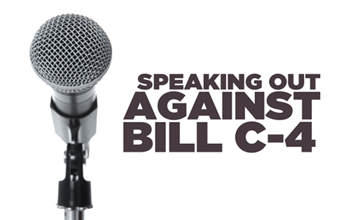Anti-Worker Law Threatens On-the-Job Rights
December 16, 2013
Unions representing more than 1 million federal workers in Canada – including the IBEW – are coming together to take on anti-worker legislation that threatens collective bargaining rights and on-the-job safety.
The more than a dozen unions say they are pooling their resources to launch a legal challenge against Bill C-4 – one of the most dramatic assaults on public workers’ rights in decades.
Introduced by Prime Minister Stephen Harper’s Conservative government in October, the legislation would drastically limit the power of federal employees and their unions to engage in workplace action, including strikes.
As the federal unions said in a statement:
The Bill gives the federal government's Treasury Board the unfettered right to determine what constitutes an essential service, which workers are denied the right to strike, and which collective agreements will be decided through arbitration.
The law also limits the ability of employees to refuse to work under unsafe working conditions, giving the Ministry of Labour the ability to throw out any unsafe work refusal complaint without investigation.
“If it’s in question, you should say ‘I’m not going to do it until I’m assured it’s safe,’” Canadian Labour Congress President Ken Georgetti told CBC News. “What they’ve changed it to say is only if the danger is imminent, if there’s an explosive or the building is on fire can you say ‘I’m not going to do that work.’”
That provision has safety advocates up in arms.
“Bill C-4 would alter what leaders have been teaching young workers across Canada – which is to stand up and report ANY and ALL workplace situations they suspect to harm their safety and/or health,” wrote workplace safety activist David Ellis on his blog.
The legislation not only applies to workers employed directly by the federal government, but to all industries under the federal labour code, including railroad, telecommunications, shipyards and pipelines.
The IBEW’s First District represents more than 6,000 federal workers.
Ottawa, Ontario, Local 2228, which represents air navigation technologists across Canada, said that Bill C-4 will also have a detrimental effect on labour relations in the federal government.
“Under the new legislative scheme, if 79 percent or less of the positions within a bargaining unit are considered essential, arbitration will not be available unless both parties agree,” it wrote on its Facebook page. “Workers who find themselves among this group may be forced to take job action or strike even though their preferred course involves dialogue and the arbitration process.”
The federal union coalition says that in addition to preparing their legal challenge, they agree to work together to uphold collective bargaining in next year’s round of negotiations and to build a grassroots movement against Bill C-4 among public-sector workers.
Click here to read more about why Bill C-4 is wrong for Canada.
Related news:
Tories Target Federal Workers’ Rights
Secret Document Exposes Tories’ Anti-Worker Agenda

|
 Related Articles
Related Articles

